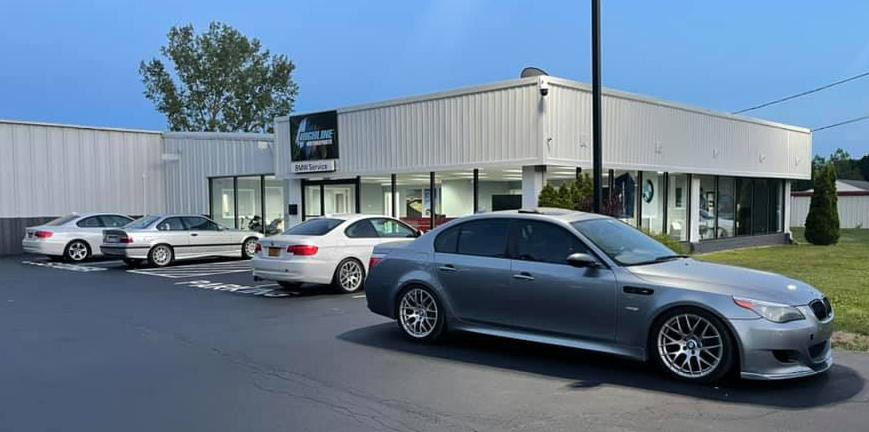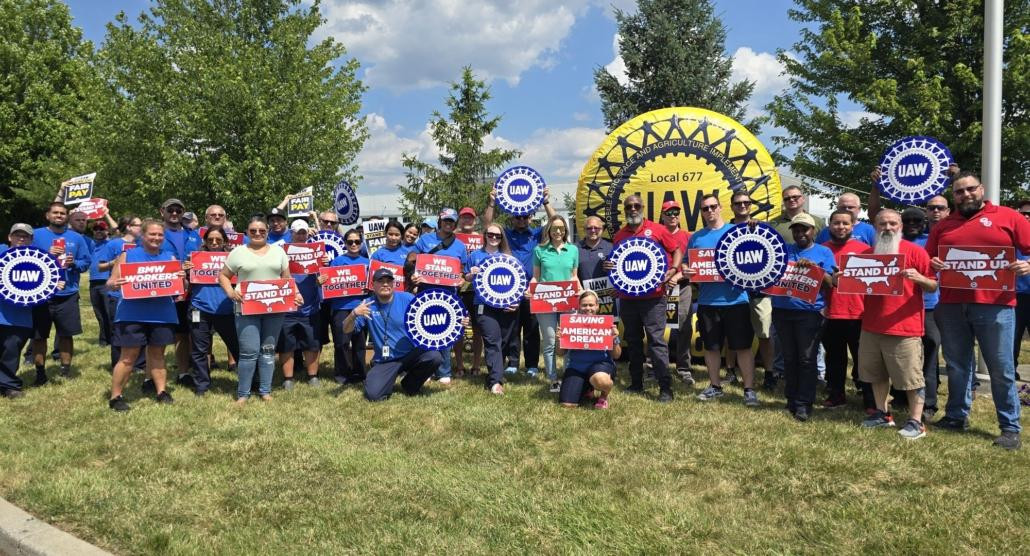The July labor deal reached by union workers at BMW’s Northeast distribution center will help ensure a continued steady supply of OEM parts and happy customers, BMW-certified repair shop executives told Autobody News.
United Auto Workers (UAW) voted to ratify a contract that will raise pay up to 33%, and include more labor-friendly policies for time off, uniforms, overtime and attendance for workers at the Nazareth, PA, BMW Regional Distribution Center (RDC), UAW announced July 8.
The agreement followed a “credible strike threat,” UAW said. In light of reported BMW policies against shipping parts across regions and selling directly to independent, certified shops, the averted strike in Nazareth was critical in securing the strength and efficiency of OE shops’ parts pipelines.
BMW Repairers Encouraged by Labor Stability
“To be honest, if they did go on a strike, I feel like it’d just be another day or two” to get parts, Dave Singh, owner of Highline Motorsports in Burnt Hills, NY, told Autobody News. “In the auto parts world, it’s a big deal, for sure. It’s not the end of the world, though. We’ve gone through worse.”
 Highline Motorsports in Burnt Hills, NY.
Highline Motorsports in Burnt Hills, NY.
The Burnt Hills location exclusively repairs BMWs, using all OE and OEM parts, Singh said. The shop, which does mostly general maintenance and performance upgrades, typically gets parts one day after ordering them from the Nazareth plant, he said. The shop saw no supply chain disruption amid the strike threats. But the signed contract is important for Highline’s continued viability, as the shop spends about $60,000-$70,000 directly on BMW parts every month, Singh said.
Eighty-Four, PA-based Kilkeary’s Auto Body President Tim Kilkeary and parts manager Zach Brust were also generally encouraged by BMW’s labor stability.
The BMW-certified collision repair center primarily sources its BMW sheet metal body parts like bumpers, fenders and hoods, from the Nazareth plant.
The labor deal saved Kilkeary’s from significantly delaying customers’ repair times, and guarded its local BMW dealer from several potential trips across the Pennsylvania/Ohio state line, Kilkeary and Brust said. That’s the site of a meeting place where employees from a friendly Cleveland-area BMW dealership sell parts to employees of one of Kilkeary’s regular BMW dealership-vendors in Western Pennsylvania.
Kilkeary’s goes through that assiduous process when Nazareth is out of stock of certain needed items, and is often forced to bulk buy to make it worthwhile.
“If the [Nazareth] warehouse doesn’t have it, we’re waiting to receive 10 or 15 or 20 of something before [the local BMW dealership] can send it to us,” Kilkeary said. “It’s kind of a one-hand-washes-the-other kind of thing. [The Ohio dealers] help our dealership, and our dealership helps them.”
BMW collision repairs comprise about 30% of Kilkeary's business, he said.
BMW's Unique Supply Chain Causes Complications
More complicated for BMW-certified repair shops than the threat of a labor shutdown is the uniqueness of automotive supply chains in general, and BMW’s supply chain, specifically.
When one RDC is out of a part, BMW does not allow distribution centers in other regions to cross-ship those parts to the sapped storehouse, which can convolute the repair process, Brust said. He believes the policy is to prevent parts damage, but it extends repair timeframes.
“They are basically told at the dealership that they can’t receive that hood from Nazareth, and they aren’t going to receive one from another RDC facility, because they will no longer ship sheet metal,” Brust said. “I guess they incurred too many damages when they were cross-shipping stuff during the [recent auto parts] shortage.”
BMW did not respond to Autobody News requests for a response.
Repairers told Autobody News that shops have two general options when it comes to sourcing BMW OE and OEM parts -- to buy from a dealership or from an online retailer like FCP Euro or WORLDPAC.
That stems from BMW’s policy to not ship parts directly to certified independent repair shops, as even online retailers must source BMW OE and OEM parts from dealers, according to Singh.
Because BMW limits its parts supply line to its own dealerships, these dealers have become competitors with their previous independent shop customers, Singh said. That restricted supply chain has also contributed to increased prices and a more burdensome parts sourcing process, he said.
“Two of the three local dealerships stopped selling to us, because we do a lot of business,” Singh said. “We’re at our last dealership that’s selling us parts.”
But there’s workarounds, he said. “If they don’t sell to us, we can get it elsewhere,” Singh noted. “We can buy from a dealer out of state.”
James Rome, president of Pasadena, MD-based Rome Technologies, which provides technology to help collision repair centers’ efficiency, also noted BMW closely guards its parts distribution process, and said periodic trends like slumping car sales can generally push dealerships to expand their fixed operations like general service, collision repair and wholesale parts.
BMW dealers will sell to independent shops as long as that stays profitable for the dealers, Rome said.
“If new car sales are down, used car sales are down, because of the pricing and inventory rates, all the dealers are going to focus on fixed operations,” Rome said. “It’s becoming more and more their business.”
To maintain wholesale viability, BMW dealers must simply sell enough parts vis a vis their service and collision repair businesses to stay profitable, he said.
It’s just a matter of, “Does the dealer want to do that? Is that going to hinder anything they’re doing or not doing?” Rome said. “I’m sure if there’s a will, there’s a way.”













Brian Bradley